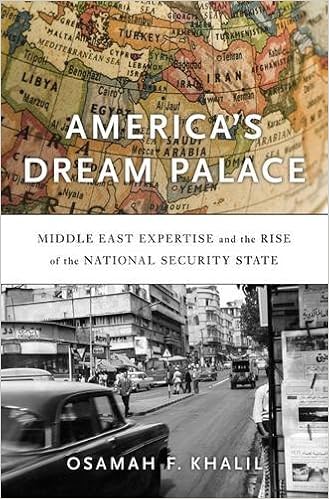
America’s Dream Palace offers a wide-ranging exploration of the complex relationship between the knowledge that Americans have produced about the Middle East and the exercise of American power in the region, from the First World War down to the invasion of Iraq. Well-researched and engagingly written, it should be of interest to scholars and nonscholars alike. America’s Dream Palace is a brilliant and meticulously researched work. Khalil carefully documents how scholars’ production of knowledge about the Middle East shaped, and was shaped by, the rise of America as a twentieth-century global military power. This is a vital contribution to our understanding of Middle East studies and to our understanding of the political economy of knowledge production. Thoroughly documented, carefully argued, and well crafted. In a detailed look at the nexus of American academic expertise on the Middle East and Washington’s diplomatic and intelligence power centers, from the Wilson era through the Obama presidency, Khalil keeps his prose crisp and his judgments sober. In T. E. Lawrence’s classic memoir Seven Pillars of Wisdom, Lawrence of Arabia claimed that he inspired a “dream palace” of Arab nationalism. What he really inspired, however, was an American idea of the area now called the Middle East that has shaped U.S. interventions over the course of a century, with sometimes tragic consequences. America’s Dream Palace brings into sharp focus the ways U.S. foreign policy has shaped the emergence of expertise concerning this crucial, often turbulent, and misunderstood part of the world.
Khalil provides a trove of new data, especially about the pre–Cold War and post-2001 eras, [but] his interest isn’t so much the history of ideas as the institutional career of Middle East studies in America. He’s particularly good at piecing together scattered archival evidence to reveal previously hidden patronage relationships between area specialists and government agencies such as the State Department and the CIA. And by quoting one undeniably prejudiced statement after another, he demonstrates the Orientalism of successive generations of Middle East experts to devastating overall effect. In this timely study, Khalil provides a thorough analysis of how U.S. foreign policy interests have driven the development of American specialist knowledge about the Middle East from WWI to today…Khalil demonstrates how American analysis of the Middle East has been, and continues to be, tainted with the ideology of American exceptionalism and orientalist notions of the region’s political and cultural immaturities and deformities, even today.
No comments:
Post a Comment